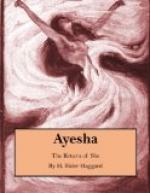“It is right, therefore, that you should be the first to learn also of Ayesha, Hesea and Spirit of the Mountain, the priestess of that Oracle which since the time of Alexander the Great has reigned between the flaming pillars in the Sanctuary, the last holder of the sceptre of Hes or Isis upon the earth. It is right also that to you first among men I should reveal the mystic consummation of the wondrous tragedy which began at Kor, or perchance far earlier in Egypt and elsewhere.
“I am very ill; I have struggled back to this old house of mine to die, and my end is at hand. I have asked the doctor here, after all is over, to send you the Record, that is unless I change my mind and burn it first. You will also receive, if you receive anything at all, a case containing several rough sketches which may be of use to you, and a sistrum, the instrument that has been always used in the worship of the Nature goddesses of the old Egyptians, Isis and Hathor, which you will see is as beautiful as it is ancient. I give it to you for two reasons; as a token of my gratitude and regard, and as the only piece of evidence that is left to me of the literal truth of what I have written in the accompanying manuscript, where you will find it often mentioned. Perhaps also you will value it as a souvenir of, I suppose, the strangest and loveliest being who ever was, or rather, is. It was her sceptre, the rod of her power, with which I saw her salute the Shadows in the Sanctuary, and her gift to me.
“It has virtues also; some part of Ayesha’s might yet haunts the symbol to which even spirits bowed, but if you should discover them, beware how they are used.
“I have neither the strength nor the will to write more. The Record must speak for itself. Do with it what you like, and believe it or not as you like. I care nothing who know that it is true.
“Who and what was Ayesha, nay, what is Ayesha? An incarnate essence, a materialised spirit of Nature the unforeseeing, the lovely, the cruel and the immortal; ensouled alone, redeemable only by Humanity and its piteous sacrifice? Say you! I have done with speculations who depart to solve these mysteries.
“I wish you happiness and good fortune. Farewell to you and to all.
“L. Horace Holly.”
I laid the letter down, and, filled with sensations that it is useless to attempt to analyse or describe, opened the second envelope, of which I also print the contents, omitting only certain irrelevant portions, and the name of the writer as, it will be noted, he requests me to do.
This epistle, that was dated from a remote place upon the shores of Cumberland, ran as follows:—
“Dear sir,—As the doctor who attended Mr. Holly in his last illness I am obliged, in obedience to a promise that I made to him, to become an intermediary in a some what strange business, although in truth it is one of which I know very little, however much it may have interested me. Still I do so only on the strict understanding that no mention is to be made of my name in connexion with the matter, or of the locality in which I practise.




